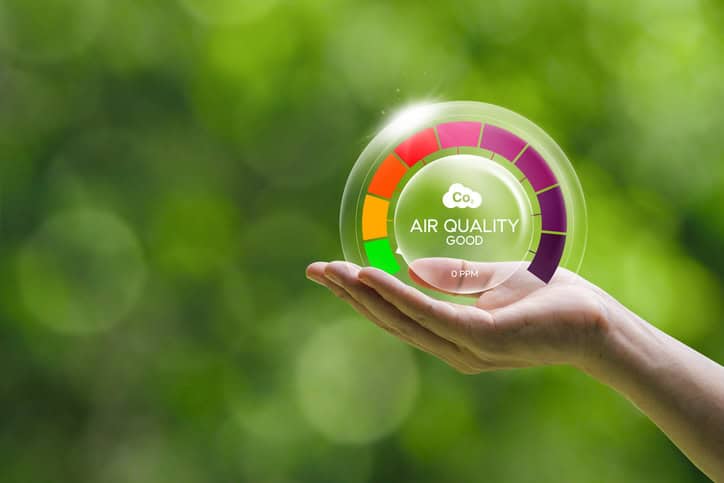Summer brings heat alerts, storm warnings, and—increasingly—air quality alerts. “For the nearly 5 million children in the United States with asthma, those air quality alerts provide crucial information that help parents plan their day and manage their children’s health,” says Dr. Ahmad Chatila, pediatric pulmonologist with Alzein Pediatrics.
What is Asthma?
Dr. Chatila explains that asthma is a chronic condition characterized by overly-sensitive airways in the lungs. “These airways narrow in response to a trigger, leading to increased inflammation in the airways and excess mucus production.” He explained that, beyond those immediate physiological reactions, asthma will then look different depending on how the sensitivity is triggered and how severe the reaction.
“Some children experience “intermittent” asthma, with less than two attacks a week. Other kids have what’s called “persistent” asthma,” Chatila says. Persistent asthma patients can be differentiated based on severity: mild, with more than two attacks a week but less than one in a day; moderate, with daily attacks; or severe, experiencing continual symptoms.
What are Triggers?
Poor air quality, Dr. Chatila explains, is one of the most common triggers of an asthma attack. “Triggers are internal or external factors that cause asthma symptoms to develop. Poor air quality alerts happen when the long and sunny days increase ground level ozone. This is an invisible air pollutant created when sunlight breaks down other kinds of air pollution, irritating airways when breathed in.”
“We also differentiate asthma patients based on what triggers their attacks,” says Dr. Chatila. “Patients can suffer from allergic or non-allergic asthma. Allergic triggers include allergens like pollen, mold, dust mites and pet dander or fur. Allergic asthma attacks can also be triggered by foods.”
Non-allergic asthma attacks can be triggered by any number of things. “Asthma attacks can also be triggered by environmental hazards like smoke, chemicals or fumes. When your child’s asthma attacks are triggered by pollution, that’s when it’s important to pay close attention to air quality alerts,” notes Dr. Chatila.
Some non-allergic asthma attacks are triggered by physical activity, known as exercise-induced asthma. “Your child may be able to swim for hours, but be triggered when hiking up a hill. It may not be every form of activity that causes an attack.” Attacks can be triggered by stress or by a respiratory illness such as a cold, the flu or COVID infections.
When Does Asthma Develop?
Dr. Chatila explains, “For children with pediatric asthma, the sensitivity begins very early, usually by age 5, because of exposure to pollutants prior to the immune system fully developing, a genetic predisposition to asthma, or some other delay in lung development. In some cases, prolonged or intense exposure to a trigger can result in adult-onset asthma.”
How is Asthma Treated?
“Because asthma is a chronic condition, there is no cure,” says Dr. Chatila. “However, there are a range of treatments for the various types and severities of asthma that can minimize flare ups and consequences.”
Children with asthma will require different treatments for different aspects of asthma. A child’s pediatric pulmonologist may recommend bronchodilators, with or without steroids, for quick relief of asthma attacks. “There are also a range of medications to prevent those flare-ups from happening in the first place.” Long-term treatments for asthma of greater severity can include steroids, immunotherapy, and anti-inflammatory drugs. “There is no one approach to treatment,” says Dr. Chatila. “Just as every child’s asthma triggers, severity and overall health are different, so should be the treatment approach. Your child’s pediatric pulmonologist should take all factors, including a child’s age, weight and ability to administer their own treatment, into account when putting together a comprehensive plan.”
Can Asthma Attacks Be Avoided?
Identifying and avoiding a child’s unique triggers is one of the most important steps in managing asthma symptoms. “That’s where those air quality alerts become very important, such as dangerous ozone levels or a high pollen count,” says Dr. Chatila. “Keep your child inside, with the air conditioning on and the windows closed, especially at night, when air quality alerts indicate very poor air quality. Never allow anyone to smoke or vape around your child.”
Dr. Chatila also recommends considering an indoor air filter to help reduce the amount of air pollution and other contaminants inside your home. If you have a pet, vacuum daily using a HEPA filter. Avoid foods and other allergens that exacerbate asthma symptoms. If attacks are triggered by stress, practice breathing exercises and meditation. Turn off social media and news alerts. Ask your pediatrician about consulting a behavioral health specialist.
“Parents and children should work with their pediatrician and their pediatric pulmonologist to develop a carefully monitored plan for when attacks do occur. This plan should include a detailed medication routine, regular spirometry tests to monitor lung function, and inhaler use tracking. For instance, if your child is using a relief inhaler frequently, that means their asthma isn’t being properly managed,” says Dr. Chatila. He also stresses that staying current with all vaccinations is important to managing asthma symptoms. “Getting your child vaccinated keeps them much healthier overall, and getting vaccinations for respiratory illnesses like COVID, the flu, whooping cough and pneumonia dramatically lowers their risk for serious lung infections that worsen asthma symptoms for years to come.”
“With a proper treatment and an asthma action plan, many children experience a noticeable decrease in symptoms by adolescence,” says Dr. Chatila.
Dr. Ahmad Chatila is double-board certified in Pediatrics and in Pediatric Pulmonology. He is also certified in Pediatric Fiberoptic Bronchoscopy. Dr. Chatila is part of Alzein Pediatrics, in Oak Lawn and Evergreen Park. Alzein Pediatrics has been named the Best of the Southland, Pediatrician 2024, the third year in a row.


